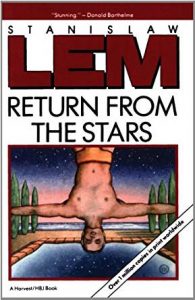 translated by Barbara Marszal and Frank Simpson
translated by Barbara Marszal and Frank Simpson
originally published in Poland: 1961
my edition: Harcourt (June 1, 1989)
256 pages
“It was a hundred and twenty-seven years ago. I was thirty then. The expedition…I was a pilot on the expedition to Fomalhaut. That’s twenty-three light years away. We flew there and back in a hundred and twenty-seven years Earth time and ten years ship time. Four days ago we returned…The Prometheus–my ship–remained on Luna. I came from there today” (28)
Thus does Hal Bregg explain his strange appearance and manners to the first woman he meets upon returning to Earth. That 127-year-long/10-year-long journey did more than just increase Bregg’s muscles and allow him to study a wide variety of subjects while en route to Fomalhaut- it also threw him and his surviving crewmates out of sync with the social mores, values, and even language of Earth (Lem implies that these sweeping changes have occurred across the globe; also we’re never told exactly which country Bregg returns to).
Just as in Eden, Return From the Stars opens with a description of the main character’s surroundings that is at once unsettlingly strange and familiar. Bregg understands that he is in some kind of terminal (after arriving by shuttle from Luna), but he can’t find his way out, becoming confused as people speed by him on strange levitating platforms and doors seem to disappear. By this point, Bregg has gone through two enormously stressful transitions: first the transition from the Earth to the blackness and indifference of space, where humans more clearly understand their insignificance and fragility in the face of the universe; and second, the transition back to an unfamiliar Earth that treats him almost with hostility and which he has difficulty navigating.
At the heart of the revolution in Earth culture is something called “betrization,” a process that took several generations to perfect. Basically, it is a medical procedure that has taken from humans the ability to kill. Now, everyone is docile, polite, and utterly indifferent to risk, adventure and space exploration. They no longer see the point of sending people out to the stars to learn about other planets or alien cultures. Such an attitude shocks Bregg at first, but then when he considers what astronauts must seem like to these new humans, he reconsiders the merits of his mission. What, after all, was the point of going out into the unknown, to face death, see friends die, know terror and unimaginable beauty, and then come back to a planet where no one wants to hear about it? I found this part of the novel quite poignant, and it brings up an issue that Liu Cixin raises in his Three-Body trilogy. For Liu, the question is: why would we even want to blow our cover and introduce ourselves to potentially (and probably) hostile alien cultures, who would want to take our resources and maybe even wipe our species off the planet? Both Lem and Liu ask us to be more thoughtful about the reasons for exploring space and what we’re prepared to learn from that endeavor.
But while the novel brings up fascinating questions, it doesn’t do justice to the main character. Lem’s descriptions of Bregg falling in love with and pursuing a shy (and already-married) woman whom he meets at a country villa are awkward and unconvincing. It’s as if Lem inserted this love story half-heartedly, thinking that it would add dimension to his main character. Not so much.
Nevertheless, Return From the Stars shows Lem’s evolving perspective on space travel and exploration, and even incorporates some imagery and discussions found in Eden, published just two years earlier. So now it’s on to Memoirs Found in a Bathtub, also translated by Marszal and Simpson. I encourage you to follow along!
